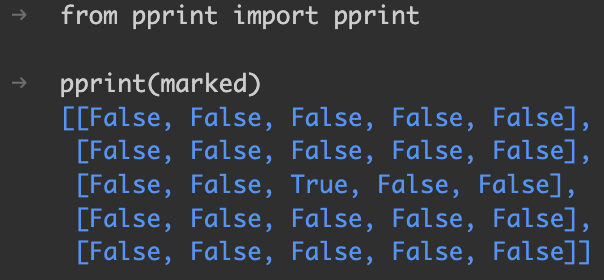2025.09.09(更新日: 2025.09.09)
new_marked関数について深掘り
はじめに
以下のビンゴゲームの「new_marked()」について、深掘りしていこう。
import random
B_RANGES = [(1, 15), (16, 30), (31, 45), (46, 60), (61, 75)]
CELL_W = 4
def generate_card():
cols = [random.sample(range(lo, hi + 1), 5) for lo, hi in B_RANGES]
card = [[cols[c][r] for c in range(5)] for r in range(5)]
card[2][2] = "FR"
return card
def print_card(card, marked=None):
header = "".join(f"{ch:^{CELL_W}}" for ch in "BINGO")
print(header)
for r in range(5):
cells = []
for c in range(5):
v = card[r][c]
if v == "FR":
s = "[FR]"
elif marked and marked[r][c]:
s = f"[{str(v).rjust(2)}]"
else:
s = f"{str(v).rjust(2)}"
cells.append(f"{s:^{CELL_W}}")
print("".join(cells))
def new_marked():
m = [[False]*5 for _ in range(5)]
m[2][2] = True # FREEは最初からマーク
return m
def mark_number(card, marked, n):
for r in range(5):
for c in range(5):
if card[r][c] == n:
marked[r][c] = True
return True
return False
def count_lines(marked):
lines = 0
for r in range(5):
if all(marked[r][c] for c in range(5)): lines += 1
for c in range(5):
if all(marked[r][c] for r in range(5)): lines += 1
if all(marked[i][i] for i in range(5)): lines += 1
if all(marked[i][4-i] for i in range(5)): lines += 1
return lines
def main():
card = generate_card()
marked = new_marked()
pool = list(range(1, 76))
random.shuffle(pool)
history = []
turn = 0
print_card(card, marked)
print("Enter=next h=history q=quit")
while True:
cmd = input("> ").strip().lower()
if cmd == "q":
print("Bye!")
break
if cmd == "h":
print(f"Called: {', '.join(map(str, history)) or '(none)'}")
continue
# Enter(空文字)以外は無視して続行
if cmd not in ("",):
continue
if not pool:
print("No numbers left. Draw game.")
break
# ここから1ターン進行
n = pool.pop()
history.append(n)
turn += 1
mark_number(card, marked, n)
lines = count_lines(marked)
print(f"\nTurn {turn} Called: {n} Remaining: {len(pool)} Lines: {lines}")
print_card(card, marked)
if lines >= 1:
print("\nBINGO! congrats!")
break
if __name__ == "__main__":
main()マーク状態を保持する
以下のnew_marked関数では、真偽値のリストを保持している。
def new_marked():
m = [[False]*5 for _ in range(5)]
m[2][2] = True # FREEは最初からマーク
return m戻り値は以下のようになる。

main関数で戻り値を使用する
以下の赤文字部分でnew_marked関数の戻り値をmarkedに代入している。
import random
B_RANGES = [(1, 15), (16, 30), (31, 45), (46, 60), (61, 75)]
CELL_W = 4
def generate_card():
cols = [random.sample(range(lo, hi + 1), 5) for lo, hi in B_RANGES]
card = [[cols[c][r] for c in range(5)] for r in range(5)]
card[2][2] = "FR"
return card
def print_card(card, marked=None):
header = "".join(f"{ch:^{CELL_W}}" for ch in "BINGO")
print(header)
for r in range(5):
cells = []
for c in range(5):
v = card[r][c]
if v == "FR":
s = "[FR]"
elif marked and marked[r][c]:
s = f"[{str(v).rjust(2)}]"
else:
s = f"{str(v).rjust(2)}"
cells.append(f"{s:^{CELL_W}}")
print("".join(cells))
def new_marked():
m = [[False]*5 for _ in range(5)]
m[2][2] = True # FREEは最初からマーク
return m
def mark_number(card, marked, n):
for r in range(5):
for c in range(5):
if card[r][c] == n:
marked[r][c] = True
return True
return False
def count_lines(marked):
lines = 0
for r in range(5):
if all(marked[r][c] for c in range(5)): lines += 1
for c in range(5):
if all(marked[r][c] for r in range(5)): lines += 1
if all(marked[i][i] for i in range(5)): lines += 1
if all(marked[i][4-i] for i in range(5)): lines += 1
return lines
def main():
card = generate_card()
marked = new_marked()
pool = list(range(1, 76))
random.shuffle(pool)
history = []
turn = 0
print_card(card, marked)
print("Enter=next h=history q=quit")
while True:
cmd = input("> ").strip().lower()
if cmd == "q":
print("Bye!")
break
if cmd == "h":
print(f"Called: {', '.join(map(str, history)) or '(none)'}")
continue
# Enter(空文字)以外は無視して続行
if cmd not in ("",):
continue
if not pool:
print("No numbers left. Draw game.")
break
# ここから1ターン進行
n = pool.pop()
history.append(n)
turn += 1
mark_number(card, marked, n)
lines = count_lines(marked)
print(f"\nTurn {turn} Called: {n} Remaining: {len(pool)} Lines: {lines}")
print_card(card, marked)
if lines >= 1:
print("\nBINGO! congrats!")
break
if __name__ == "__main__":
main()このmarkedを後のいろんな処理(以下の青字部分)で使用している。
import random
B_RANGES = [(1, 15), (16, 30), (31, 45), (46, 60), (61, 75)]
CELL_W = 4
def generate_card():
cols = [random.sample(range(lo, hi + 1), 5) for lo, hi in B_RANGES]
card = [[cols[c][r] for c in range(5)] for r in range(5)]
card[2][2] = "FR"
return card
def print_card(card, marked=None):
header = "".join(f"{ch:^{CELL_W}}" for ch in "BINGO")
print(header)
for r in range(5):
cells = []
for c in range(5):
v = card[r][c]
if v == "FR":
s = "[FR]"
elif marked and marked[r][c]:
s = f"[{str(v).rjust(2)}]"
else:
s = f"{str(v).rjust(2)}"
cells.append(f"{s:^{CELL_W}}")
print("".join(cells))
def new_marked():
m = [[False]*5 for _ in range(5)]
m[2][2] = True # FREEは最初からマーク
return m
def mark_number(card, marked, n):
for r in range(5):
for c in range(5):
if card[r][c] == n:
marked[r][c] = True
return True
return False
def count_lines(marked):
lines = 0
for r in range(5):
if all(marked[r][c] for c in range(5)): lines += 1
for c in range(5):
if all(marked[r][c] for r in range(5)): lines += 1
if all(marked[i][i] for i in range(5)): lines += 1
if all(marked[i][4-i] for i in range(5)): lines += 1
return lines
def main():
card = generate_card()
marked = new_marked()
pool = list(range(1, 76))
random.shuffle(pool)
history = []
turn = 0
print_card(card, marked)
print("Enter=next h=history q=quit")
while True:
cmd = input("> ").strip().lower()
if cmd == "q":
print("Bye!")
break
if cmd == "h":
print(f"Called: {', '.join(map(str, history)) or '(none)'}")
continue
# Enter(空文字)以外は無視して続行
if cmd not in ("",):
continue
if not pool:
print("No numbers left. Draw game.")
break
# ここから1ターン進行
n = pool.pop()
history.append(n)
turn += 1
mark_number(card, marked, n)
lines = count_lines(marked)
print(f"\nTurn {turn} Called: {n} Remaining: {len(pool)} Lines: {lines}")
print_card(card, marked)
if lines >= 1:
print("\nBINGO! congrats!")
break
if __name__ == "__main__":
main()次回予告
print_card関数について、深掘りしていこう。
def print_card(card, marked=None):
header = "".join(f"{ch:^{CELL_W}}" for ch in "BINGO")
print(header)
for r in range(5):
cells = []
for c in range(5):
v = card[r][c]
if v == "FR":
s = "[FR]"
elif marked and marked[r][c]:
s = f"[{str(v).rjust(2)}]"
else:
s = f"{str(v).rjust(2)}"
cells.append(f"{s:^{CELL_W}}")
print("".join(cells))
コメントを残す